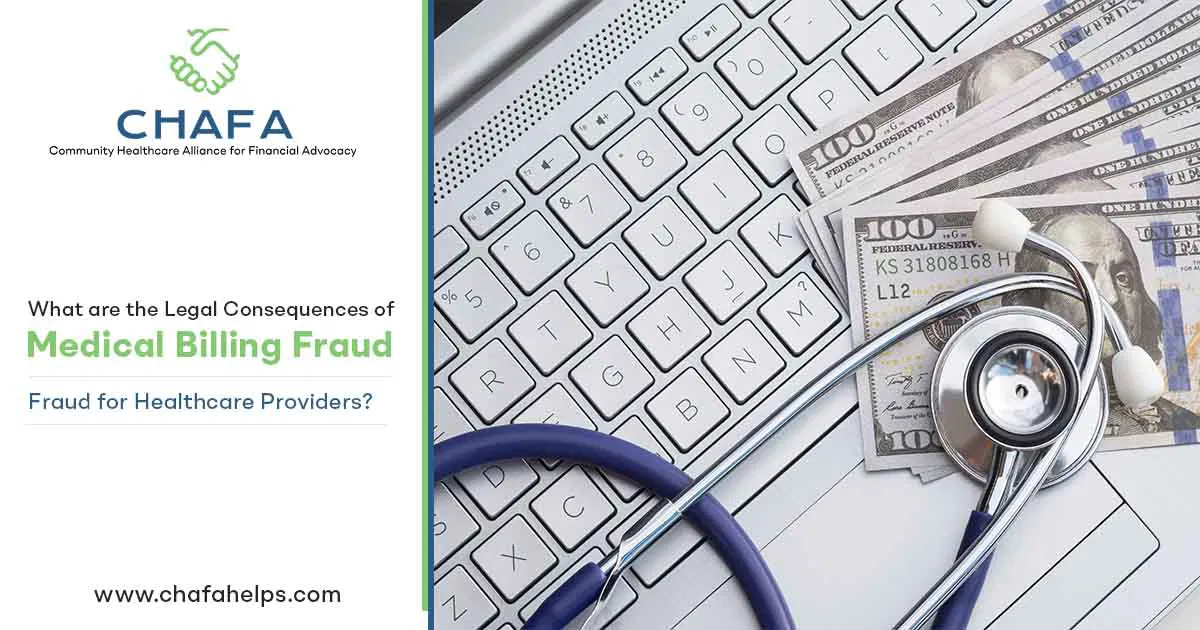Medical billing fraud is a major problem that costs the US economy billions of dollars every year and afflicts the healthcare sector. It entails healthcare practitioners purposefully lying or misrepresenting their qualifications to receive unapproved benefits or payments from payers.
While some billing fraud may result from inadvertent mistakes, the majority is the result of premeditated actions meant to maximize profits at the expense of patients and the healthcare system.
If proven guilty of such actions, healthcare personnel risk severe penalties, jail time, revocation of their medical licenses, banishment from federal health programs, and serious harm to their reputations.
Common Types of Medical Billing Fraud

- Upcoding
- Unbundling
- Phantom Billing
- Double Billing
- Kickbacks
- Overtreatment
- Misrepresentation of Services
The Legal Consequences of Medical Billing Fraud
Financial Penalties
Healthcare providers found guilty of medical billing fraud face severe financial penalties. Under the False Claims Act, violators can be required to pay treble damages, which means they must pay three times the amount of the fraudulent claims, plus additional fines per claim. These penalties can quickly add up, especially for providers who have engaged in widespread fraudulent activities over an extended period.
In addition to FCA penalties, providers may also face fines under other statutes, such as the Anti-Kickback Statute and the Stark Law. These fines can be substantial and are designed to deter fraudulent behavior and recoup funds lost to fraudulent activities.
Criminal Charges and Imprisonment
Medical billing fraud is not only a civil matter but can also result in criminal charges. The Department of Justice (DOJ) aggressively prosecutes healthcare fraud cases, and individuals found guilty can face significant prison sentences.
The severity of the sentence depends on factors such as the amount of money involved, the extent of the fraudulent activities, and whether the defendant has a prior criminal record.
Loss of Medical Licenses and Exclusion from Federal Programs
Healthcare providers convicted of medical billing fraud risk losing their medical licenses and being excluded from participating in federal health programs such as Medicare and Medicaid. State medical boards have the authority to revoke or suspend licenses for unethical or illegal behavior, and a fraud conviction often triggers such disciplinary actions.
Exclusion from government programs is a significant outcome as well. If someone is found guilty of any crime, including fraud, the Office of Inspector General (OIG) has the power to bar them from taking part in federal health programs. For healthcare professionals, exclusion can be fatal to their careers as it drastically restricts their ability to practice and make a living.
Reputational Damage
The reputational damage resulting from a medical billing fraud conviction can be devastating. Healthcare providers rely heavily on their reputations to attract and retain patients, and a fraud conviction can erode trust and credibility. Negative publicity can lead to a loss of business, and patients may choose to seek care from providers with untarnished reputations.
In addition, healthcare organizations may face difficulties in securing contracts, partnerships, and funding. Insurance companies, hospitals, and other healthcare entities may be reluctant to associate with providers who have a history of fraudulent behavior.
Preventing and Mitigating the Risks of Medical Billing Fraud
- Implementing Robust Compliance Programs
- Engaging Legal and Compliance Experts
- Conducting Regular Risk Assessments
- Promoting a Culture of Integrity
- Leveraging Technology
Conclusion
Medical billing fraud poses significant legal and financial risks for healthcare providers. The consequences of engaging in fraudulent billing practices are severe, including substantial financial penalties, criminal charges, imprisonment, loss of medical licenses, exclusion from federal health programs, and reputational damage.
Healthcare providers must take proactive steps to prevent and mitigate the risks associated with billing fraud.
To learn more about healthcare fraud, visit our website.

